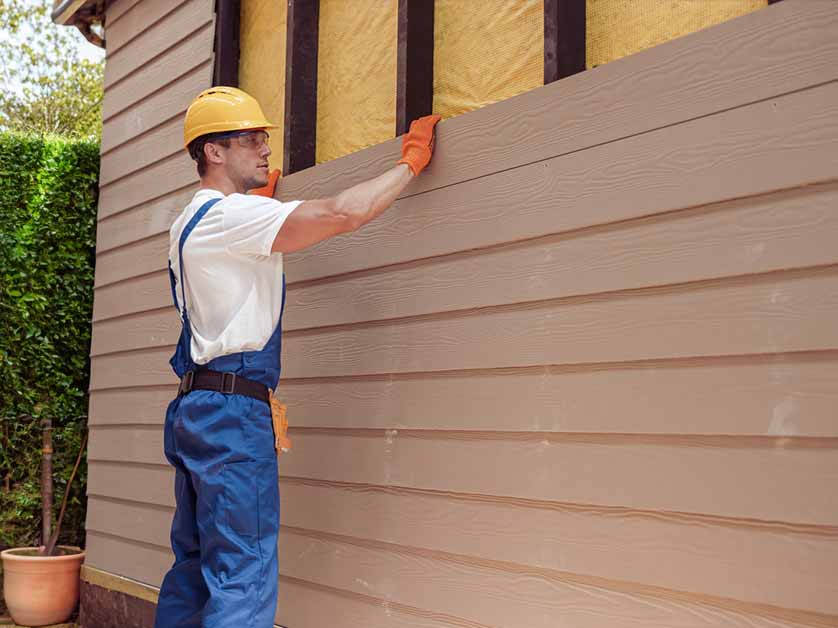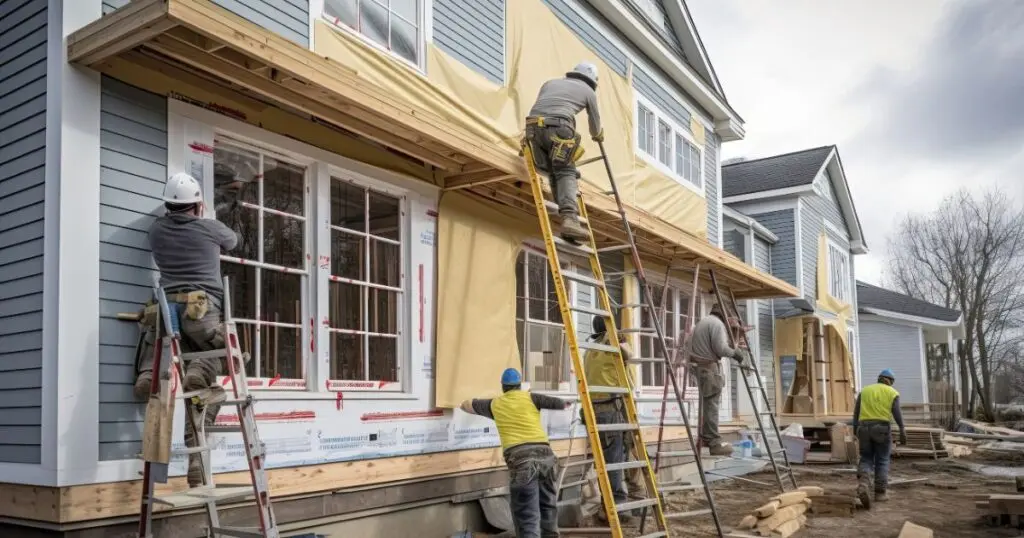Morris Siding Contractor Providing Energy-Efficient Home Exterior Installations
Morris Siding Contractor Providing Energy-Efficient Home Exterior Installations
Blog Article
The Important Guide to the Different Kinds Of Siding and Their Special Advantages
In the realm of home renovation, selecting the best exterior siding is a vital decision that impacts both aesthetic allure and useful efficiency. With so lots of options to take into consideration, which home siding product truly stands out for your particular project?
Timber House Siding
Timber house siding, a popular option for property outsides, provides a timeless visual that integrates natural beauty with architectural stability. This house siding product is readily available in different designs, including clapboard, tiles, and board-and-batten, permitting house owners to customize their façade to match their style choices. Wood home siding is usually crafted from long lasting species such as cedar, redwood, or ache, which are understood for their strength and capability to withstand ecological stress factors.
Among the key advantages of timber house siding is its outstanding insulation buildings, which can add to power effectiveness and reduced home heating prices. Furthermore, wood house siding is biodegradable, making it an eco-friendly alternative when sourced sustainably. Routine upkeep, consisting of paint or discoloration, can prolong its life expectancy and improve its appearance, enabling home owners to maintain the natural charm of the wood.
Nonetheless, prospective downsides include sensitivity to bugs, rot, and weather condition damage, requiring adequate treatment and maintenance - morris siding contractor. Despite these issues, when correctly cared for, wood house siding can offer a lovely and resilient service that enhances the personality of a home while providing a warm, welcoming atmosphere

Plastic House Siding
Vinyl house siding has emerged as a leading choice for homeowners looking for a low-maintenance outside option that incorporates resilience and cost. This functional product is crafted from polyvinyl chloride (PVC), making it immune to numerous weather, consisting of dampness and UV rays. Therefore, plastic home siding does not warp, rot, or discolor, making certain long-lasting aesthetic appeal.
One of the key benefits of vinyl house siding is its substantial series of colors and designs, permitting homeowners to accomplish the desired appearance for their home without the requirement for regular repainting. Furthermore, plastic home siding is easy to install, which can significantly lower labor expenses throughout building or improvement jobs.
Vinyl home siding likewise adds to energy efficiency. Lots of alternatives feature insulation support, which boosts thermal performance, assisting to keep comfy interior temperature levels and potentially lowering power expenses. Moreover, its smooth surface area promotes easy cleaning, needing only regular cleaning with a garden hose to remove dust and particles.
Fiber Concrete Siding
Fiber concrete siding has acquired grip among house owners and contractors alike due to its impressive combination of sturdiness and aesthetic flexibility. Made up of a mixture of cellulose, concrete, and sand fibers, this home siding choice is crafted to endure severe climate conditions, consisting of high winds, heavy rainfall, and temperature changes, making it a durable option for domestic exteriors.
Among the main advantages of fiber concrete siding is its resistance to bugs, such as termites, and its non-combustible nature, offering enhanced fire security. morris siding contractor. Furthermore, it is offered in a vast range of shades, appearances, and styles, allowing property owners to achieve their wanted visual without giving up performance
One more advantage is its low upkeep needs; fiber concrete siding normally calls for painting or discoloration every 5-10 years, which is much less regular than various other materials. Its long life contributes to a reduced total cost of possession, as it decreases the demand for frequent fixings or substitutes.
Inevitably, fiber concrete house siding represents an excellent investment for those seeking a resistant, attractive, and flexible outside option, integrating both type and function to enhance the home's curb charm.
Metal House Siding
The allure of metal exterior siding hinges on its robust toughness and modern-day visual charm, making it a preferred option for contemporary style. Available in materials such as light weight aluminum and steel, steel siding provides a series of my blog colors and finishes, allowing homeowners to achieve a tailored appearance that enhances their design vision.

Energy performance is an additional significant advantage, as several steel home siding products are designed with insulation choices that assist control interior temperatures. This can lead to reduced visit here power costs with time. Additionally, metal house siding is commonly recyclable, making it an eco-friendly option for sustainability-minded home owners.
The installation procedure for metal house siding can be fairly simple, resulting in a quicker turn-around time for building projects. Generally, steel siding incorporates functionality and design, making it a functional alternative for those looking for a enduring and visually attractive outside coating.
Brick and Rock House Siding
Block and stone exterior siding attracts attention as an ageless option that improves the aesthetic appeal of any kind of home. Known for their toughness and low maintenance, these products provide an exceptional roi while boosting the residential property's curb appeal. Readily available in numerous shades, textures, and patterns, brick and rock can be customized to match varied architectural styles, from traditional to contemporary.
One of the main advantages of block and stone house siding is their energy efficiency. Both materials have natural insulating properties that assist regulate interior temperature levels, potentially reducing heating & cooling prices. In addition, they provide superior fire resistance contrasted to various other siding options, contributing to improved safety and security.
Another advantage is their longevity. Brick and stone can last for decades, usually requiring marginal upkeep past periodic cleansing. Unlike timber exterior siding, they are unsusceptible bugs and rot, guaranteeing a lasting outside that holds up against the components.
Verdict
In recap, the choice of home siding significantly affects a home's aesthetic appeal, energy effectiveness, and maintenance needs. Each sort of siding-- whether timber, plastic, fiber block, metal, or concrete and rock-- offers unique advantages customized to various homeowner choices and environmental conditions. Recognizing these options makes it possible for educated choices that enhance both the resilience and visual appeal of household outsides. Eventually, picking the best siding is necessary for attaining an equilibrium between capability and design in domestic style.
One of the main advantages of timber siding is its excellent insulation residential properties, which can index add to power effectiveness and lower home heating prices. In addition, wood house siding is eco-friendly, making it an environmentally friendly alternative when sourced sustainably.One of the main advantages of steel home siding is its resistance to different ecological elements.Power efficiency is one more considerable benefit, as lots of steel house siding items are developed with insulation alternatives that help regulate indoor temperatures. Each type of home siding-- whether timber, vinyl, fiber cement, steel, or brick and rock-- uses distinct benefits customized to various house owner preferences and ecological problems.
Report this page